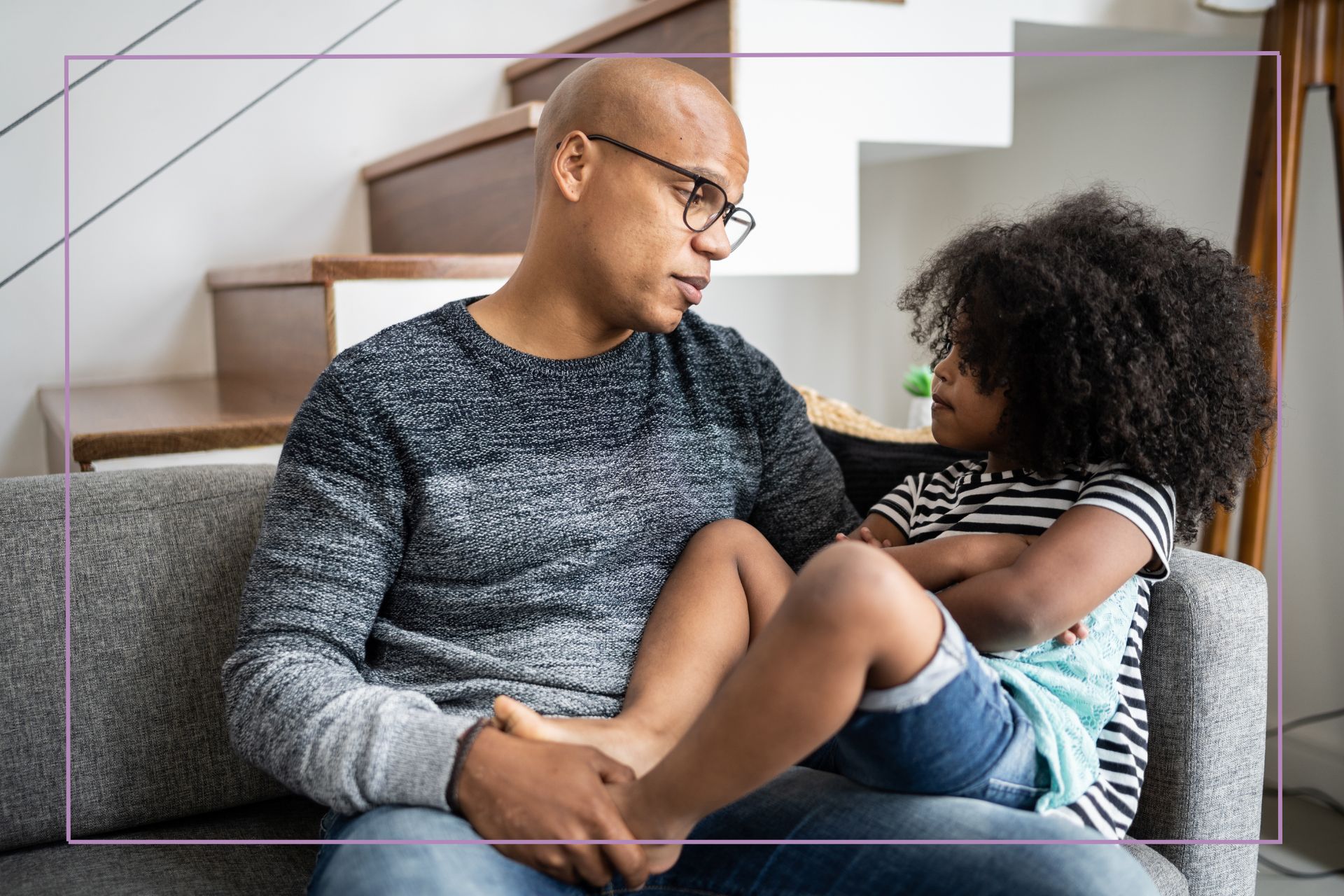How to talk to kids about divorce - it's never easy, here our experts share the best ways to do it in this age-by-age guide
Plus they reveal the two things to do before broaching it


Parenting advice, hot topics, best buys and family finance tips delivered straight to your inbox.
You are now subscribed
Your newsletter sign-up was successful
Having concerns over breaking the news of a divorce to kids is natural. From offering emotional support to the legalities of separation, our experts guide you through the process.
It will never be an easy decision to permanently call time on a marriage, but sometimes it's best for everyone involved to put an end to a failing union. Matrescence and an imbalance in the distribution of the mental load can be at the heart of relationship problems. A sexless marriage can also be responsible for putting a marriage on the path to dissolution. Whichever reasons are the cause, parents will want to limit the impact of divorce on their kids.
Who to contact for guidance and support
NSPCC: The NSPCC have an abundance of resources to help the process, with everything from advice on contact arrangements to how to find mediation services.
Citizens Advice: Information on how much the process might cost, and how to get help with legal fees.
Young Minds: Also offers a support helpline for parents going through divorce, along with signposting to relevant services.
Gingerbread: A helpline is available, and plenty of advice to help parents dispel potential myths about the impact of divorce on children.
Heidi Soholt is a highly experienced BACP accredited psychotherapist who specialises in working with young people and adults. She told us "Being prepared when speaking to children about divorce will help ensure the best outcome for everyone. Spending some time reflecting on and processing your own feelings first will provide a vital sense of grounding and confidence in broaching this difficult and sensitive subject. Your children will need a calm presence in order to feel safe enough to express difficult emotions."
Along with Heidi's advice to prepare for difficult conversations about divorce, we've consulted a Family Law expert about what parents commonly ask from a legal perspective. Broken down by age, we've got summaries for approaching discussions about separation, for those with very young children right up to those with teens. We also take a look at what might happen after the conversation, to leave you feeling prepared for the aftermath.
How to talk to kids about divorce
Mary Kaye is an experienced Family Law Solicitor, and partner at Rayden Solicitors. Offering her legal perspective, Mary told us "Some of the most common concerns we see are parents asking how to tell their children that they're separating. A lot of the time, this includes asking whether parents should tell the children together, or whether the children will have to accompany them to court. Parents separating need not be difficult for children, many children experience their parents separating each year. It really is in the hands of parents, how easy this process will be for their children."
Mary added "Children suffer harm not when parents separate, but when they are trapped in long, hostile disputes. We'd recommend working together outside of Court proceedings. Draft together a parenting plan, and use all the tools at your disposal to come to an amicable agreement. Depending on the age of your children, you can involve your children in decisions that concern them - why should a stranger make decisions for your children?"
Heidi Soholt reminds us that every family is individual, and they ways they speak to their children about divorce will be unique. However, she shared with us her top tips to remember for each age group of children, when breaking the news.
Parenting advice, hot topics, best buys and family finance tips delivered straight to your inbox.
0-5 years
Very young children are still highly dependent on parents. Babies and toddlers will have little to no understanding of difficult events or their own feelings about them. For those just starting to think about feelings, it's unlikely they'll be able to talk about them - most in this age group won't have the ability to anticipate the future.
Heidi said "Young children will need time to properly understand that the changes brought about by divorce are permanent. They may harbour fantasies about mum and dad getting back together, and it is therefore important to help them understand the realities of the situation."
She suggests keep explanations simple as possible, keeping in mind that the primary concern of this age group is likely to be related to their own safety. She added "Reassure them that the people who love and care for them will still be there, including the wider family, and that the things they love, e.g., cherished routines such as bedtime stories and playground visits, will not disappear."
Heidi concluded "Babies and toddlers will be supported through the changes brought by a divorce as long as they are securely attached to one caregiver. Basic routines are extremely important for the very young, so try to keep disruptions to sleep times, feeding and so on as minimal as you can. Ensuring you have your own supports in place will also be important to very young who are especially vulnerable to parental stress."
6-11 years
During this stage of their lives, children develop insight and understanding that others have views and opinions different to their own. Explanations for this age group will still need to be simple, and child friendly language used. This age group can be encouraged to express their thoughts and feelings, but they might not always be what parents anticipate - they could be muddled or even unexpected.
Heidi told us "Children are extremely attuned to their parents and may already understand there are difficulties. It may come as a relief to have their suspicions confirmed and an outlet for their worries. Children often have worries about the feelings/welfare of their parents and need reassurance that while grown-ups may feel sad, they know how to keep themselves okay."
"Children will also benefit from activities such as stories, arts and crafts to express feelings"
Heidi Soholt, BACP accredited psychotherapist
Worries will likely be focused on the practicalities of the divorce, and the important connections they're now building away from their caregivers. They could be concerned about where they will live, whether they will stay at the same school, and keep the same friends. It's important to offer honesty, clarity and support around any changes, from the first discussion.
Heidi offered her opinion on this, saying "While this age group is not as egocentric as young children i.e., they are beginning to understand that the world does not revolve around them, they may still assume that they are somehow to blame for a marriage breakdown. It may be important to carefully explore any underlying assumptions and worries they may have, in order to reassure them this is 'adult stuff' and not about them."
12-14 years
This age group are in the first throws of peeling away from their families, and connections with friends are extremely important - they may choose their peers to share their feelings with, instead of parents. Heidi refers to those aged 12-14 as being in a state of 'flux' and swinging between child like and adult states.
She warns "No matter how grown-up they may seem, your teen will require as much support as young children. They may find it more difficult to express how they feel with parents, but they need to know you’re there for them. Teens will need space and privacy to process, let them know this is okay and that you understand."
With the ability to understand adult relationships, this developmental stage is also characterised by big emotions and black and white. Heidi told us to expect children to pull away from discussions at home, and can have strong feelings about divorce and their altered circumstances - including anger.
"Children suffer harm not when parents separate, but when they are trapped in long, hostile disputes."
Mary Kaye, Family Law Solicitor
Heidi said "This is normal and with support they will be able to work through intense emotions. Sports and creative outlets can be useful outlets for anger. However, keep an eye out for marked behavioural changes at school, clubs or with friends, as these can indicate how your child is coping. It may be useful to look for support outside home, such as school counselling."
She added "It is important to ensure your young person understands you are there for them, if they want to talk. Try to avoid giving advice – being emotionally available and listening is more important to this age group. It can be helpful to take an accepting stance towards feelings, but boundaries are also important – no matter how mature your young person seems, they will feel reassured by knowing the same ‘rules’ and expectations apply."
Offer regular reminders that you are always available to them, and maintaining routines can be just as important as for younger children. Continue to let them know they are not to blame, and that any feelings they have are valid and acceptable.
After the conversation
It will take time for children to process and come to terms with the changes involved in a divorce. Heidi reminds parents that although children may not initially understand the ramifications of the situation, their feelings could intensify as reality sets in.
Support will need to be ongoing, especially when new homes are involved, and new partners potentially introduced. Expect that a child could grieve for their old life, and offer them space to process this. Heidi suggests using examples from previous experiences of coping with loss, such as reminding them how they felt after a pet or relative passed away, and how they learned to get used to the loss.
Heidi said "Children will also benefit from activities such as stories, arts and crafts to express feelings they may not be able to easily articulate. Be open about your feelings – this will give children a sense of permission to express theirs. However, try to maintain a positive perspective by finding other outlets for your deeper feelings about the divorce."
"Spending some time reflecting on and processing your own feelings first"
Heidi Soholt, BACP accredited psychotherapist
She added "Ensure your child understands they are not alone and that you will come through this together. Try to respect and support your child’s feelings about your ex-partner. Accept that these may be muddled and changing over time. Avoid discussing your own feelings about your ex, find other outlets to do this. Remember that your child did not have a choice in the divorce, and that their relationships may continue while yours have come to a close.
Consider speaking to your child’s school about significant changes at home. It is important that teachers are aware of any needs your child may have for ongoing support."
The key phrases Heidi suggests parents use and reiterate to calm their children, include "Mum and dad care about each other but feel happier when apart," or "Although there are lots of changes right now, mum and dad still love you – that won’t change at all" and "Mum and dad will care for you just the same, even if they don’t live together."
Mary Kaye concluded "Children want to be free to love both parents; it's important that during proceedings like this, you do not burden them with your differences. Decisions you make now will impact children long into the future, I've wished many times that I had a crystal ball to show parents how what they do now will affect their children for the rest of their lives."

Heidi Soholt is a highly experienced BACP accredited psychotherapist who specialises in working with young people and adults in her private practice. Heidi is based in Stirling, Scotland, but also provides support to clients online. She believes wholeheartedly helping people maintain good levels of mental health from as early in life as possible and is passionate about our ability to heal and overcome life's challenges - whatever our age. Her areas of expertise include anxiety, depression, self-esteem issues and relationships (including parent-child). Heidi uses an integrated approach in her counselling, drawing on experience in a range of modalities including Cognitive Behaviour Therapy (CBT), Acceptance and Commitment Therapy (ACT), Person-Centred and creative approaches. She is also trained in EMDR.

Mary is experienced in all areas of family law, both nationally and internationally, including financial matters, pre-nuptial agreements, post-nuptial agreements, cohabitation agreements and divorce.
Divorce after a baby is more common that you think, and a psychotherapist has shared their top five co-parenting tips for divorced parents. It's not always easy to move on after divorce, and some women regret it - we found out why.

Lucy is a mum-of-two, multi-award nominated writer and blogger with six years’ of experience writing about parenting, family life, and TV. Lucy has contributed content to PopSugar and moms.com. In the last three years, she has transformed her passion for streaming countless hours of television into specialising in entertainment writing. There is now nothing she loves more than watching the best shows on television and sharing why you - and your kids - should watch them.